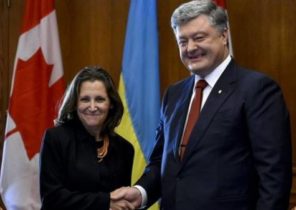
With such unexpected headline article in the current issue of the Economist, which, as you know, has a reputation as one of the most conservative publications in the UK.
Moreover, the subtitle is the authors of the article write: “the Leaders of the labour party right — today’s politicians can learn from Karl Marx.”
In England from time immemorial, the unofficial rule according to which participants of pre-election debates do not refer to the names of major thinkers. But on 7 may this tradition for the first time broke the “shadow” Finance Minister the labour party John McDonnell (John McDonnell), who in his speech recalled not just one of the great thinkers of the past, traditionally respected in the UK, and Karl Marx himself, given that “Capital” is the main work of this economist-philosopher today can teach a lot. Moreover, the next day the leader of the labour party Jeremy Corbyn (Jeremy Corbyn) has called Marx’s “great economist”.
In the British press raised a wave of emotions. The Daily Telegraph very disparagingly called McDonnell and Corbin “the Marx brothers”, and The Daily Mail reminded readers of the bloody history of communism. Even the first Deputy Minister of Finance of great Britain David GOK (David Gauke) has refrained from public statements and warned about the plans of “the labour leaders-Marxists” to make the UK “an extremely left-experiment”. In his opinion, the reasoning of Marx “meaningless.”
However, in the UK there was also another reaction. So, the Economist experts believe that McDonnell is right: the Brits do have much to learn from Marx. And here are the arguments lead the authors of the article. They think every day about what Marx said, it seems more consistent with reality. His theory is based on the idea that the capitalist class does not consist of wealth producers, and parasites — those who are appropriating the results of someone else’s work and passes it off as their own. Marx overlooked the important role of entrepreneurship in creating something out of nothing. He did not recognize the role of managers in improving productivity. British experts say: today it is obvious that in the soil of British business really thrives parasitism. In 1980-ies the heads of the hundred largest public companies earned on average 25 times more than their employees. In 2016 — in 130 times. In addition to the exorbitant salaries they receive substantial pensions, access to private medicine, “Golden handshakes” and “Golden parachutes”.
Justifying this luxury, they say that every product has its price: the company’s claim that the find their top managers on the open market and pay for their labor in accordance with its quality. However, as experts point out, the facts suggest otherwise. Most CEOs — not people from outside: they have built a career in “his” company, which has risen up through the ranks. In the period 2000-2008 the total FTSE fell by 30%, however, the amount that businesses pay their executives increased by 80%. John Galbraith (John Kenneth Galbraith) once frankly said: “the Salaries of Directors of large companies is not a market reward for achieving them. Often, it is just the sincere friendly feelings to themselves”. And the British corporate environment, according to themselves as British, is more insidious: the CEO is responsible to the Board of the corporations to each other and involved in an intricate exchange of “pleasantries”.
Experts draw attention to the fact that parasitism in politics has become as commonplace. British experts write that the politicians simply turn your long experience in the civil service into a source of income: having gone with her, they perekvalifitsiruetsya of the foresters in poachers, lobbying the Ministry they were once in charge; advising companies whose activities they once regulated, and a complete pronouncing platitudes of speeches for big money. The authors remind us that after he retired, Tony Blair (Tony Blair) made a fortune on the business of bankers and dictators in third world countries. Former Finance Minister George Osborne (George Osborne) also gets benefit in that he earns in excess of 650 thousand pounds (840 million dollars), working once a week in the company of the trust’s investment management Black Rock, is getting tens of thousands for speeches and now even became the editor of London newspaper the Evening Standard.
Marx predicted that, as of its development, capitalism will become more and more concentrated. The number of companies listed on the stock exchange declined, although revenues have reached a historic high. The concentration is particularly pronounced in the advanced sectors of the economy. In the UK, Google controls 85% of search engine traffic. In addition, we have to admit that come true and the predictions of Marx that under capitalism, increasing the impact of taking on the financial sector, which thus becomes on the one hand increasingly irresponsible and on the other all the more vulnerable to the crisis.
The Economist experts are asked and other uncomfortable question: how about the most famous of Marx’s prediction that capitalism inevitably leads to the impoverishment of the working class, even if he brings windfall to the rich? Analysts say that, of course, on the surface it is unlikely that the term “poverty” is applicable to the situation of the poor where there is a system of social protection and minimum wages. However, according to experts, a number of clearly marked trends really worrisome. In the UK, the average salary remains lower than in the period before the crisis of 2008. And this situation is likely as the British experts believe, will continue over the next few years. The development of the Uber economy is threatened by the fact that millions of people will lose their job and fall into dependence on casual earnings.
Experts believe that the problem with Marx is not that his theory is meaningless, as suggested by the GOK, and that the proposed remedy is far worse than the disease that it is intended to treat. And the problem with Corbin and MacDonnell an — not that they learned anything from Marx, and that they have not learned a single lesson from the history of the last hundred years. McDonnell not only a fan of Marx, but also of Vladimir Lenin and Leon Trotsky. Corbin calls Fidel Castro “a champion of social justice.” The election Manifesto of the labour resurrects the oft-forgotten plans to renationalizing production and expand the possibilities of trade unions in terms of negotiating with employers.
The authors of the article in The Economist I think that the fact that the leaders of the labour party are unable to come to terms with the new, only increases the chances of the conservatives winning. However, in their opinion, the tories are in danger of making the mistake of ignoring the lessons of Marx. They resemble the words of another revolutionary, Trotsky: “You may not be interested in the dialectic but the dialectic is interested in you.” After all, the financial crisis has demonstrated that the economic system is frighteningly vulnerable. And the victory of “Breccia” showed that millions of people are deeply dissatisfied with the status quo.
The Economist writes that the genius of the British system has always been in the ability to reform itself, and that was to protect the country from social upheaval. According to the authors of the article, under the significant word “reform” meant something more and deeper than that, for example, last week suggested the conservatives. The tories believe that now you just need to fix electricity prices, and this, they say, will produce the desired effect. However, British experts took the news differently and described the plans of the conservatives as “stupid” as it would “discourage investment and lead to higher prices”.
According to experts, it is necessary to conduct a serious strategy and structural transformation. Analysts believe that, first of all, you need to take under strict control the formation of monopolies. This will need to modernise British anti-trust legislation, bearing in mind that the most valuable resource today is information. Today it is obvious that the network effect benefits gives companies a huge advantage. Experts believe that it is high time to put an end to “salary racket” of top managers. In parallel, you need to expand the powers of the shareholders. Finally, it is important to close the “revolving door” between politics and business. The best way to avoid becoming the next victim of Marx is to start taking it seriously.
The question, however, is only, whether it will turn out.







